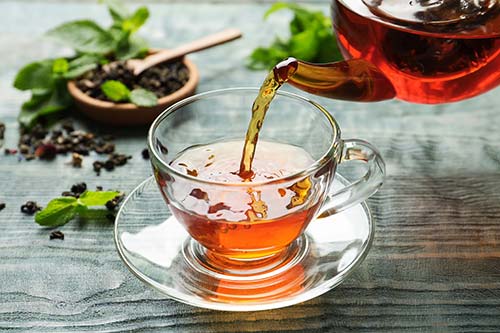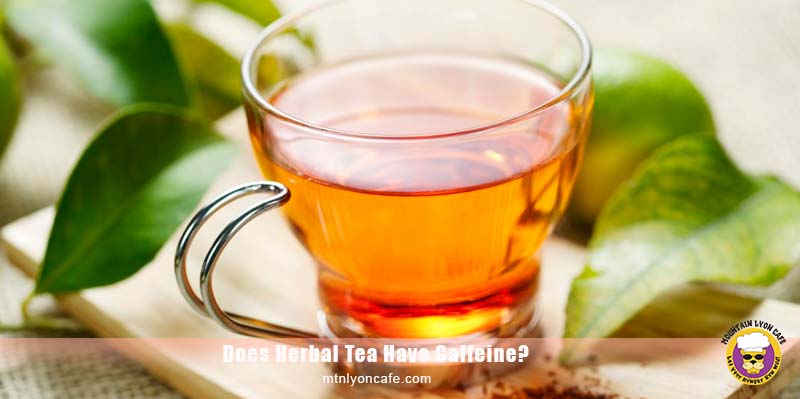Introductions
Herbal tea has been growing in popularity over the years, touted for its numerous health benefits and delicious flavors. But one question that often arises among tea lovers is, “Does herbal tea have caffeine?” The answer is not a straightforward one, as herbal teas are made from a variety of plants, some of which naturally contain caffeine while others do not.
In this article, we will explore the world of herbal tea and answer the question: Does herbal tea have caffeine?
Overview of Caffeine Content in Herbal Teas
Origins Of Herbal Types Of Tea

Herbal tea, also known as tisane, is a beverage made by infusing leaves, roots, flowers, or herbs in hot water. The practice of drinking herbal teas dates back centuries and can be traced to ancient civilizations such as the Chinese and Egyptians.
The use of herbs for medicinal purposes has been documented throughout history, and many cultures have traditional herbal remedies that are still used today. With the rise of tea consumption worldwide, herbal teas have become more popular in recent years due to their health benefits and unique flavors.
What is Herbal Tea?

Herbal tea is not technically a true tea, as it does not come from the Camellia sinensis plant like black, green, and white teas. Instead, herbal teas are made from various plants and herbs that are steeped in hot water to create a flavorful and aromatic beverage.
Some common ingredients used in herbal teas include chamomile, peppermint, ginger, and hibiscus. These ingredients are known for their natural health benefits, making herbal tea a popular choice for those looking to incorporate more natural remedies into their daily routine.
Related article:
Intermittent Fasting Coffee with Milk – The Pros and Cons
How Much Caffeine in Iced Tea? Exploring Different Brands and Comparisons
17 Impressive Health Benefits Of Oolong Tea: Nutrients in Oolong tea
The Allure Of Herbal Tea
Naturally Caffeine-free Blends Of Soothing Herbs, Flowers, And Fruits
One of the main reasons for the growing popularity of herbal tea is its caffeine-free nature. Unlike traditional teas, which contain varying levels of caffeine, herbal teas are naturally caffeine-free as they do not come from the Camellia sinensis plant.
For those who are sensitive to caffeine or looking to reduce their overall intake, herbal teas provide a great alternative without sacrificing flavor or health benefits. Additionally, many herbal teas are known for their calming and soothing properties, making them a popular choice for relaxation and bedtime rituals.
Does Herbal Tea Have Caffeine?
The answer to this question depends on the specific ingredients used in the herbal tea blend. Some plants and herbs naturally contain caffeine, such as yerba mate and guayusa. These blends are often marketed as herbal teas, but they do contain caffeine and should not be considered caffeine-free.
However, most common herbal tea ingredients, such as chamomile and peppermint, do not naturally contain caffeine. Therefore, if the herbal tea blend is made solely from these types of plants, then it will be caffeine-free.
Herbal Tea As A Popular Choice For Tea Lovers Seeking Alternatives To Caffeinated Beverages
As more people are becoming health-conscious and looking for alternatives to traditional caffeinated beverages, herbal tea has become a popular choice. It offers a wide variety of flavors and potential health benefits without the added caffeine. Herbal teas can also be enjoyed hot or cold, making them a versatile option for all seasons.
The Difference Difference Between Herbal and Decaf Tea?
The main difference between herbal tea and decaf tea is the source of caffeine. As mentioned earlier, herbal teas do not come from the Camellia sinensis plant and therefore do not contain any caffeine unless specifically added.
On the other hand, decaf tea is made from traditional tea leaves that have undergone a decaffeination process to remove most of the naturally occurring caffeine. This allows for a lower caffeine content in decaf tea compared to regular teas, but it is not completely caffeine-free.
Benefits and Improve of Drinking Herbal Tea Help Your Health
Health Benefits of Low-Caffeine Herbal Teas
Herbal teas are known for their numerous health benefits, many of which are linked to the specific ingredients used in each blend. For example, chamomile tea is often used for its calming and anti-inflammatory properties, while ginger tea is believed to aid digestion and relieve nausea.
Additionally, as herbal teas are naturally caffeine-free, they can be a great option for those looking to reduce their caffeine intake and improve their overall health. Some studies have shown that excessive caffeine consumption can lead to anxiety, disrupted sleep patterns, and other negative effects on the body.
How To Incorporate Herbal Tea Into Your Routine
There are many ways to incorporate herbal tea into your daily routine. You can enjoy a cup in the morning as a caffeine-free alternative to traditional breakfast teas, or in the evening as a calming way to wind down before bed.
Herbal teas can also be used as part of a healthy diet and lifestyle. Many blends are known for their detoxifying and immune-boosting properties, making them a great addition to your daily wellness routine.
Improving Health with Herbal Tea: Myth or Reality?
While herbal tea cannot cure any ailments on its own, it can be a helpful addition to a healthy lifestyle. Many of the herbs and plants used in herbal teas have been used for centuries in traditional medicine for their medicinal properties.
However, it is essential to consult with a healthcare professional before using herbal teas as a treatment or remedy for any health condition. It is also crucial to source herbal tea from reputable brands to ensure the quality and safety of the ingredients.
Popular Types of Herbal Teas and Their Caffeine Content
Almost All Herbal Teas Are Caffeine-Free
As mentioned earlier, most herbal teas are naturally caffeine-free unless they contain ingredients that naturally contain caffeine. Some popular types of herbal teas and their caffeine content include:
- Chamomile tea: Caffeine-free
- Peppermint tea: Caffeine-free
- Ginger tea: Caffeine-free
- Hibiscus tea: Caffeine-free
- Yerba mate tea: Contains caffeine
- Guayusa tea: Contains caffeine
It is essential to check the ingredients list or consult with the brand if you are unsure about the caffeine content of a specific herbal tea blend.
Caffeine Content In Traditional Tea Types Compared To Herbal Tea
Compared to traditional teas, herbal teas have a significantly lower caffeine content or are completely caffeine-free. For reference, an 8-ounce cup of black tea contains around 47 mg of caffeine, while the same amount of green tea has approximately 29 mg.
In comparison, most herbal teas contain less than 2 mg of caffeine per cup, with some blends being completely free of caffeine. This makes herbal tea a suitable alternative for those looking to reduce their caffeine intake.
Does Herbal Tea Have Caffeine and How to Grow Your Own Herbal Tea Garden
If you are concerned about the caffeine content of herbal tea or simply enjoy gardening, why not consider growing your own herbal tea garden? Many common ingredients used in herbal teas can easily be grown at home, such as chamomile and peppermint.
Tips for Making the Perfect Cup of Herbal Tea
Use Fresh, Filtered Water
When making herbal tea, it is crucial to use fresh, filtered water for the best results. Tap water can contain impurities and affect the taste of your tea. Additionally, using hot or boiling water can also impact the flavor of certain herbal teas, so be sure to pay attention to specific brewing instructions.
Steep Longer For Stronger Flavor
Unlike traditional teas, herbal teas often require a longer steeping time to fully extract their flavor and potential health benefits. Be sure to follow the recommended steeping times for each herbal tea blend, or experiment with different lengths of time to find your preferred strength.
Add Honey or Other Sweeteners For A Touch Of Sweetness
If you prefer a sweeter taste, consider adding a touch of honey or other natural sweeteners to your herbal tea. This can enhance the flavor and make it more enjoyable for those who may not be used to drinking unsweetened teas.
How to Incorporate Herbal Tea Into Your Daily Routine for Maximum Benefits
Drink Herbal Tea Before Bed For A Calming Effect
Many herbal teas, such as chamomile and lavender, have calming properties that make them the perfect beverage to enjoy before bedtime. Not only can it help promote relaxation and a good night’s sleep, but it also serves as a healthy alternative to sugary or caffeinated beverages.
Enjoy Iced Herbal Tea On Hot Summer Days
Herbal tea can also be a refreshing and hydrating option on hot summer days. Simply brew and chill your favorite herbal tea blend for a delicious and caffeine-free iced tea to enjoy anytime.
Swap Out Your Morning Coffee For A Cup Of Herbal Tea
If you are looking to reduce your caffeine intake, consider swapping out your morning cup of coffee for a cup of herbal tea. It can provide a similar comforting and warm beverage without the caffeine crash later in the day.
Factors that Determine the Amount of Caffeine in Herbal Tea
The Specific Ingredients Used in the Herbal Tea Blend
As mentioned earlier, the specific ingredients used in herbal tea can affect its caffeine content. For example, yerba mate and guayusa are two popular herbs used in some herbal teas that naturally contain caffeine.
The Brewing Method and Time
The brewing method and time can also impact the amount of caffeine in your cup of herbal tea. Steeping for longer or using hotter water can result in a higher caffeine content, while shorter steeping times or cooler water can yield less caffeine.
Alternatives to Traditional Herbal Teas with High Caffeine Levels
While most herbal teas are naturally caffeine-free or contain low levels of caffeine, some may still opt for completely caffeine-free options. In this case, there are many alternatives available, including decaffeinated herbal tea blends or caffeine-free herbal infusions.
Conclusion: Herbal Tea and Caffeine – Finding The Right Balance For You
In conclusion, herbal tea can be a delicious and healthy beverage with the added benefit of being naturally caffeine-free. However, it is crucial to pay attention to the specific ingredients and brewing methods if you are looking to consume herbal tea without caffeine.
Ultimately, finding the right balance for your personal preferences and health needs is key when incorporating herbal tea into your daily routine. Whether it’s enjoying a cup before bed or opting for caffeine-free alternatives, there is a perfect herbal tea blend for everyone. Experiment with different flavors and brewing methods to find your perfect cup of herbal tea.
FAQs
Q: Does chamomile tea have caffeine?
A: No, chamomile tea is caffeine-free.
Q: Is peppermint tea caffeinated?
A: No, peppermint tea is caffeine-free.
Q: Can ginger tea keep me awake at night?
A: Ginger tea is caffeine-free and should not interfere with sleep.
Q: What is the best time of day to drink herbal tea?
A: There is no one “right” answer to this question, as it depends on individual preferences. Some people prefer to drink herbal tea in the morning to help wake them up, while others enjoy a cup before bed to promote relaxation.
Q: How much herbal tea should I drink each day?
A: The amount of herbal tea you should consume each day depends on a variety of factors, including your overall health and any medications you may be taking. It’s always a good idea to talk to your doctor if you have any concerns about adding herbal tea to your diet.
Q: Can I grow my own herbal tea garden?
A: Yes, many common herbs used in herbal teas can be easily grown at home, making it a fun and affordable option for those who enjoy gardening. Just make sure to research the specific growing conditions and care instructions for each herb before planting.
Q: Can I mix different herbal tea blends together?
A: Yes, experimenting with different herbal tea blends can be a fun way to create unique flavor profiles. However, be aware that some herbs may have contraindications or interactions with certain medications, so it’s best to consult with your doctor first before mixing and consuming multiple herbal teas.
Q: Does herbal tea have any health benefits?
A: Yes, many herbal teas are known for their potential health benefits. For example, chamomile tea is often used to promote relaxation and improve sleep, while ginger tea may help with digestion and reducing inflammation.
Q: Is herbal tea safe for children to drink?
A: It’s always best to consult with a pediatrician before giving any herbal teas to children. Some herbs may have stronger effects on young, developing bodies and can potentially interact with medications.
Q: Can I drink herbal tea while pregnant or breastfeeding?
A: It’s best to consult with your doctor before consuming herbal tea while pregnant or breastfeeding, as some herbs may not be safe for you or your baby. It’s also important to note that some herbal teas marketed as “pregnancy-safe” may still contain ingredients that can be harmful during pregnancy or while breastfeeding. Always check the ingredient list and consult with your healthcare provider before consuming herbal tea during this time.
Q: Are there any potential side effects of drinking herbal tea?
A: While herbal teas are generally considered safe, some herbs may have potential side effects or interact with certain medications. It’s important to research the specific ingredients in your herbal tea blend and consult with a healthcare professional if you have any concerns. Additionally, be aware of the recommended daily intake for each herb and avoid consuming excessive amounts. Overall, it’s always best to listen to your body and discontinue use if you experience any negative reactions.
Q: Can herbal tea help with weight loss?
A: Some herbs used in herbal teas may have properties that can aid in weight loss, such as boosting metabolism or suppressing appetite. However, it’s important to note that herbal tea alone is not a magic solution for weight loss and should be combined with a healthy diet and exercise for best results. Always consult with your doctor before incorporating any new foods or supplements into your weight loss journey.
Q: Can I add sweeteners or milk to my herbal tea?
A: This is a matter of personal preference and can also depend on the specific herbal tea blend. Some people enjoy adding honey or other natural sweeteners to their herbal teas, while others prefer them black. It’s always best to experiment and find what works for you, but be mindful of any added sugars or ingredients that may affect the overall health benefits of the herbal tea. Overall, consuming herbal tea without any additives is the healthiest option. However, it’s important to listen to your body and make choices that align with your personal preferences and dietary needs.
Q: Where can I buy high quality herbal tea?
A: High-quality herbal teas can be purchased at specialty tea shops, health food stores, or online from reputable brands. It’s important to read reviews and do some research on the brand before making a purchase, as well as checking the ingredient list for any potential allergens or harmful additives. You can also consider purchasing loose leaf herbal teas, which tend to be of higher quality compared to tea bags. Be sure to store your herbal tea properly in an airtight container away from direct sunlight or heat to preserve its freshness and flavor. Happy tea drinking! Cheers to exploring the world of herbal teas!
Resources
- Herbal Tea During Pregnancy: Is it Safe? by American Pregnancy Association
- Potential Health Benefits of Herbal Teas by Healthline

I’m Kara Chavez, and I love coffee. I like to create some of the best coffees around – espressos, lattes, macchiatos . I strive for perfection in my coffee-making skills, and I take great pride in providing a delicious cup of joe to my customers.
I’ve been working in the coffee industry for years now, and I know everything there is to know about making a perfect cup of coffee. My passion for coffee shines through in every cup that I make, and I hope that you’ll stop by soon so that I can share my love of coffee with you!

